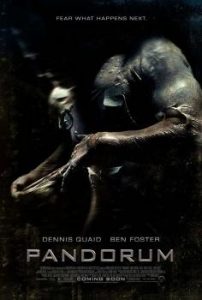
(Sight & Sound, BFI)
In 2153, a space probe discovers Tanis, an Earth-like planet which can support human life. A giant spacecraft, the Elysium, is launched towards it, carrying thousands of humans in artificial hibernation. Some time later, two crew members awake disorientated by their fragmented memories and the absence of other crew…
Pandorum is an “old dark spaceship” horror film in the thirty year-old mould of Alien (1979), and indeed, the half century-old tradition of It: The Terror from Beyond Space (1958). Much of the action involves people running from snarling flesh-eating monsters down treacherous metal corridors in near-total blackness, all set to constant background screams and roars and a noisy industrial soundtrack. Even more irksome for the amnesiac protagonists, they have no idea why any of this is happening, and they have to work out the situation on the fly. There are a couple of madmen who have the answers, while the lively climax involves a hell-pit of monsters to crawl over, and a mechanical countdown to disaster.
Unlike Alien, Pandorum never transcends its B-movie status, but it’s fairly taut and intense entertainment, though the screeching creatures (called “Hunters” in the press notes) are standard-order fare from the late Stan Winston’s monster-procuring studio. The predators are used less effectively than the cave-dwellers in The Descent (2005), a film that’s most obviously evoked when the humans wade into the monsters’ charnel-house lair. (The creatures also hold out the promise of a bigger SF twist than the film delivers.) However, there’s a genuinely sick nightmare moment in which a hapless man is revived from deep hibernation, only to be sacrificed to the ravening creatures so our heroes can get away. There’s also the now-familiar horror moment when a character fatally hesitates to kill a child monster, played in this case by the director’s daughter.
Pandorum works best in its tense early two-handers between Ben Foster and Dennis Quaid, as Foster winds through suffocating ventilation shafts and dark passages, with Quaid trying to keep him calm on the radio as their situation worsens. (Quaid plays what is really a secondary character, despite his first billing in the credits.) German newcomer Anjte Traue makes a disappointingly flat kick-ass heroine; the only other female presence is a wife who’s confined to flashbacks, much like the recent science-fiction Moon. Martial Arts star Cung Le has no function as a tagalong ally except to throw some punches at the monsters. The paranoid villain, when he’s finally unmasked, is given a little Nietzschean Superman rhetoric, but the redemptive conclusion takes the film into quasi-religious territory, and brings Pandorum to a surprisingly powerful end (certainly better than a comparable ending to this year’s portentous Knowing).
Overall, Pandorum is an above-par post-Alien scare film about running around in the dark, but it blurs in the mind with innumerable similar films even while you’re watching it. As of writing, it’s done weak business, despite looking stylish for its $40 million budget, the chases through shadow alternating with harsh bursts of white and red light, and some sturdy effects shots topping and tailing the film. A German-American co-production, filmed in Potsdam’s Studio Babelsberg, Pandorum is one of two new horrors by director Christian Alvart, who previously made the serial-killer drama, Antibodies (2005). Alvart’s long-delayed Case 39 is scheduled for UK release next January.
[amazon_link asins=’B00EU73DO4,B002U573US,B002U573V2′ template=’ProductCarousel’ store=’anime04c-21′ marketplace=’UK’ link_id=’e770a332-c844-11e8-a97c-83aedf988653′]